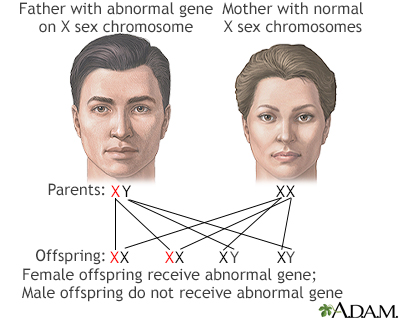Sex-linked recessive
Inheritance - sex-linked recessive; Genetics - sex-linked recessive; X-linked recessive
Sex-linked diseases are passed down through families through one of the X or Y chromosomes. X and Y are sex chromosomes.
Dominant inheritance occurs when a variant gene from one parent causes disease, even though the matching gene from the other parent is normal. The variant gene dominates.
But in recessive inheritance, both matching genes must be variant to cause disease. If only one gene in the pair is variant, the disease does not occur or it is mild. Someone who has one variant gene (but no symptoms) is called a carrier. Carriers can pass variant genes to their children.
The term "sex-linked recessive" most often refers to X-linked recessive.

Genetics is the study of heredity and how traits are passed along from parents to offspring. Genes are contained within the chromosomes found within the egg and sperm. Each parent contributes one half of each pair or 23 chromosomes to their child, 22 autosomal and 1 sex chromosome. The inheritance of genetic diseases, abnormalities, or traits is described by both the type of chromosome the abnormal gene resides on (autosomal or sex chromosome), and by whether the gene itself is dominant or recessive.
Information
X-linked recessive diseases most often occur in males. Males have only one X chromosome. A single recessive gene on that X chromosome will cause the disease.
The Y chromosome is the other half of the XY gene pair in the male. However, the Y chromosome doesn't contain most of the genes of the X chromosome. Because of that, it doesn't protect the male. Diseases such as hemophilia and Duchenne muscular dystrophy occur from a recessive gene on the X chromosome.
TYPICAL SCENARIOS
In each pregnancy, if the mother is a carrier of a certain disease (she has only one variant X chromosome) and the father is not a carrier for the disease, the expected outcome is:
- 25% chance of a healthy boy
- 25% chance of a boy with disease
- 25% chance of a healthy girl
- 25% chance of a carrier girl without disease
If the father has the disease and the mother is not a carrier, the expected outcomes are:
- 50% chance of a having a healthy boy
- 50% chance of a having a girl without the disease who is a carrier
This means that none of his children would actually show the signs of the disease, but the trait could be passed to his grandsons.
X-LINKED RECESSIVE DISORDERS IN FEMALES
Females can get an X-linked recessive disorder, but this is very rare. A variant gene on the X chromosome from each parent would be required, since a female has two X chromosomes. This could occur in the two scenarios below.
In each pregnancy, if the mother is a carrier and the father has the disease, the expected outcomes are:
- 25% chance of a healthy boy
- 25% chance of a boy with the disease
- 25% chance of a carrier girl
- 25% chance of a girl with the disease
If both the mother and the father have the disease, the expected outcomes are:
- 100% chance of the child having the disease, whether boy or girl
The odds of either of these two scenarios are so low that X-linked recessive diseases are sometimes referred to as male only diseases. However, this is not technically correct.
Female carriers can have a normal X chromosome that is abnormally inactivated. This is called skewed X-inactivation. These females may have symptoms similar to those of males, or they may have only mild symptoms. Females with Turner syndrome (who have only 1 X chromosome) may also have X-linked recessive conditions if they carry the recessive trait on the one X chromosome they have.
References
Gregg AR, Kuller JA. Human genetics and patterns of inheritance. In: Lockwood CJ, Copel JA, Dugoff L, eds. Creasy and Resnik's Maternal-Fetal Medicine: Principles and Practice. 9th ed. Philadelphia, PA: Elsevier; 2023:chap 1.
Jones KL, Jones MC, Campo M. Genetics, genetic counseling, and prevention. In: Jones KL, Jones MC, Campo MD, eds. Smith's Recognizable Patterns of Human Malformation. 8th ed. Philadelphia, PA: Elsevier; 2022:chap 2.
Korf BR, Limdi NA. Principles of genetics. In: Goldman L, Cooney KA, eds. Goldman-Cecil Medicine. 27th ed. Philadelphia, PA: Elsevier; 2024:chap 31.
Scott DA, Lee B. Patterns of genetic transmission. In: Kliegman RM, St. Geme JW, Blum NJ, et al, eds. Nelson Textbook of Pediatrics. 22nd ed. Philadelphia, PA: Elsevier; 2025:chap 97.
Sondheimer N. Patterns of single-gene inheritance. In: Cohn RD, Scherer SW, Hamosh A, eds. Thompson & Thompson Genetics and Genomics in Medicine. 9th ed. Philadelphia, PA: Elsevier; 2024:chap 7.
Version Info
Last reviewed on: 3/31/2024
Reviewed by: Anna C. Edens Hurst, MD, MS, Associate Professor in Medical Genetics, The University of Alabama at Birmingham, Birmingham, AL. Review provided by VeriMed Healthcare Network. Also reviewed by David C. Dugdale, MD, Medical Director, Brenda Conaway, Editorial Director, and the A.D.A.M. Editorial team.
